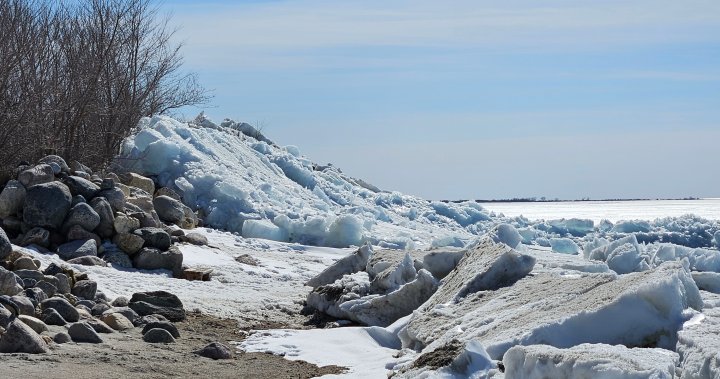Northwest of Winnipeg, the Rural Municipality of St. Laurent is dealing with the aftermath of an ice wall on Lake Manitoba that was pushed toward Twin Lakes Beach by strong northwestern winds. The ice wall caused damage to boathouses, cottages, and decks in the area. Residents are left picking up the pieces as they wait for the ice to melt and assess the costs of repairs. Despite not being an annual occurrence, residents are aware that ice walls are a regular phenomenon that they must be prepared for.
Alice Dent, a long-time resident of Twin Lakes Beach, described the fear and helplessness that residents experience when faced with an ice wall. She expressed gratitude for not being directly impacted but showed empathy for those who were affected. Lack of insurance coverage is a major concern among residents, as they will have to cover the costs of repairs themselves. The Rural Municipality is unable to provide financial assistance for such events, leaving affected individuals to handle the situation on their own.
Richard Chartrand, reeve of the RM of St. Laurent, emphasized the community’s awareness of the potential risks posed by ice walls. While the municipality will offer help where possible, residents are encouraged to reach out for assistance. The community is now in a waiting game, hoping for a quick melt of the ice and calm winds to prevent further damage. However, upcoming weather forecasts predict more wind in the coming week, raising concerns about the possibility of additional damage.
Looking ahead, Chartrand highlighted the impact of climate change on the region, referencing a recent marsh fire near Twin Lakes Beach. The community is facing challenges on both sides, with drought on one side and ice on the other. The memory of the 2011 flood on Lake Manitoba still lingers, which caused significant damage to Twin Lakes Beach and other communities, costing the province over $1 billion. The community remains vigilant and prepared for future natural disasters as they continue to deal with the aftermath of the ice wall.
Overall, the residents of Twin Lakes Beach are dealing with the aftermath of the ice wall with a sense of resilience and community spirit. Despite the challenges they face, they are coming together to support each other and assess the damage. While the situation is difficult, the community remains hopeful for a quick resolution and is preparing for potential future events. The impact of climate change on the region serves as a reminder of the importance of being vigilant and prepared for natural disasters. As they navigate through this challenging time, the residents of Twin Lakes Beach are resilient in the face of adversity.


